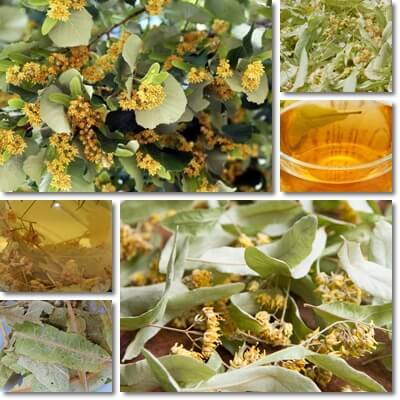Linden tree flowers, bark and leaves all carry medicinal properties and have been used therapeutically for thousands of years. The flowers, bark and leaves have been used separately, or together, in various preparations, to cure, soothe and boost physical and mental health. Linden leaves in particular have excellent therapeutic properties and are an important source of benefits for health.
What is linden leaf tea?
Linden leaf tea is a herbal tea made exclusively from fresh or dried linden leaves. The leaves from any Tilia tree species can be used therapeutically to make tea, decoctions or other medicinal preparations, but the most commonly occurring species are preferred. The tea can be made by either infusing or boiling linden leaves, either fresh or dried leaves, whole, chopped or, less commonly, ground.

What does linden leaf tea look like?
Linden leaf tea can be a very pale, almost translucent yellow color, or darker, going from a light amber to an orangey brown. If the leaves are fresh, or fresher, the tea can have a greenish tinge. Color intensity also differs according to how long the leaves are infused and how concentrated the tea is.
What does linden leaf tea taste like?
Linden leaf tea has a pleasant earthy taste with light herbal flavor notes and mild taste intensity. If there are also linden flowers present, the tea will have a delicate sweetness to it, and a faint sweet, floral smell.
Find out more about linden flower tea.
What is linden leaf tea good for?
People drink linden leaf tea for a variety of purposes. Most common uses of linden leaf tea include: headaches and migraines, anxiety, stress, sleeplessness and poor sleep quality (insomnia), stomach pain, painful abdominal cramps, colic, detox, constipation relief, UTIs, kidney function support, respiratory infections, cough, sore throat, fever, liver protection, high blood sugar control, diabetes management, high blood pressure, water retention, weight loss, inflammation, immune system support.

Linden leaf tea benefits for health
It’s caffeine free
Linden leaf tea is naturally caffeine free which makes it a good option for anyone with sleep problems such as difficulty falling asleep or trouble staying asleep. Because it’s caffeine free, linden leaf tea is also good for anyone with palpitations, extrasystoles and other forms of arrhythmia, but also high blood pressure, anxiety or anyone dealing with high levels of stress.
Lowers blood pressure numbers
Linden leaf tea has scientifically proven anti-hypertensive benefits. What makes linden leaf tea good for high blood pressure is a type of flavonoid antioxidant called tiliroside. Tiliroside occurs naturally in linden leaves, and flowers, and research shows it lowers blood pressure via two mechanisms:
- Tiliroside induces a vaso-relaxant response, that is, it causes the smooth muscle cells of blood vessel walls to relax.
- Tiliroside exerts a vasodilating action which means it causes blood vessel walls to dilate which allows for better blood flow.
Together, the vaso-relaxant and vasodilating activities achieve antihypertensive benefits, actively lowering high blood pressure numbers. Research shows the blood pressure lowering effects of tiliroside from linden leaves, flowers and linden tea are dose-dependent and long-lasting (source). Additionally, linden leaf tea has a diuretic action which further contributes to its anti-hypertensive benefits.
Reduces anxiety naturally
There are a lot of effective natural remedies for anxiety, and linden tea is one of them. Studies show linden leaves, and flowers, contain biologically active chemicals that exert a depressant action on the central nervous system resulting in sedative effects and an anxiolytic action (source).
Another way linden leaf tea lowers anxiety is via its anti-hypertensive action: components in the tea such as tiliroside, quercetin, kaempferol etc. cause blood vessels to dilate and relax, improving blood flow and general wellbeing and reducing agitation, nervousness, palpitations, extrasystoles and other triggers for anxiety. Linden tea is also caffeine free which further makes it good for anxiety.
Benefits for headaches and migraines
Headaches and migraines can be triggered by dehydration, feeling cold, stress, anxiety, tiredness, high blood pressure and a host of other causes. Linden leaf tea constitutes a great natural remedy for preventing and relieving headaches and migraines. For one, the warmth of the infusion helps raise body temperature slightly and dilate blood vessels which improves blood flow – this can result in almost instant relief when it comes to headaches and migraines.
Linden leaves and leaf tea also contain tiliroside which has been shown to relax blood vessel walls and dilate blood vessels for better blood flow, effects that could lead to headaches and migraines relief. Tiliroside and other bioactive chemicals in linden leaves and leaf tea further exert a sedative action on the central nervous system, as well as antispasmodic effects, with additional benefits for pain relief.
Good for sleep problems
You can drink linden leaf tea if you have trouble sleeping to enjoy a good night’s sleep. Linden leaf tea contain bioactive flavonoid antioxidants such as tiliroside which studies show have sedative effects, and reduce anxiety and stress levels, helping you fall asleep and sleep better.
If you have insomnia, a cup of warm linden tea before bedtime every day can help you fall asleep and stay asleep by also reducing high blood pressure numbers and inducing calm and relaxation, prerequisites for a good night’s sleep.
Good for stomach cramps and stomach upset
Linde tea is a great tea for digestive upset. For one, the warmth of the tea and the water itself restore a sense of wellbeing at the level of the GI tract by raising body temperature slightly and restoring adequate levels of hydration. This also helps support normal gastrointestinal function and digestion. Mucilage from linden flowers in mixed linden leaf and flower tea have an emollient action in contact with the mucous membranes of the GI tract which further promotes digestive wellbeing.
More important, linden tea has antispasmodic benefits, meaning it relives spasms of the muscles of the digestive tract. In other words, it helps relieve cramps and pain associated with various stomach problems such as indigestion or bloating. The herbal infusion is also a reputed carminative, helping eliminate excess air from the digestive tract, with benefits for bloating, burping, flatulence and associated abdominal cramps and stomach pain.
Diuretic action, combats water retention
Linden leaf tea exerts natural diuretic properties, helping increase the elimination of urine and support kidney function and kidney health. The tea also encourages the elimination of excess sodium, in addition to fluids, and actively combats water retention and associated swelling of the arms, hands, legs, ankles, feet, abdomen and face puffiness.
Helps lower blood sugar levels
Studies show flavonoid antioxidants such as tiliroside, but also alkaloids and other chemicals in linden have a hypoglycemic action, that is, lower levels of sugar in the blood (study). Empirical evidence further shows linden leaf tea can also exert some degree of hypoglycemic activity which could recommend it for use for blood sugar control.
Liver protective effects
Research shows tiliroside, a flavonol glycoside in linden leaves, flowers, leaf and flower tea, actively protects liver cells from injury (study). Drinking linden tea regularly can provide hepatoprotective benefits and protect the liver from damage.
Benefits for respiratory infections
Drinking linden leaf tea induces perspiration which helps bring down fever naturally. Linden leaf tea is also a source of biologically active pollen particles that stimulate the immune system and trigger an immune system response that helps clears out infection and reduce associated inflammation. The warmth of the tea soothes and calms the irritated mucous membrane of the throat, and helps relieve cough.
The tea is also a source of hydration, helping combat dehydration and restore vitality. Studies also show bioactive compounds in linden leaf tea such as tiliroside, quercetin, isoquercetin and more have analgesic and sedative properties which can help with pain management in sore throat.
Pain-relieving properties
Linden has been shown to have analgesic properties, and considered for potential uses for pain management in conditions such as rheumatoid arthritis. Biologically active chemicals in linden leaves, and flowers, such as quercetin, isoquercetin, tiliroside and more, modulate the GABAergic and serotoninergic systems of the nervous system in a way that reduces the activity of the central nervous system and inhibits the response of pain receptors, resulting in analgesic effects and benefits for pain relief (source).
Linden leaf tea side effects
Side effects: allergic reactions, anaphylactic shock
Linden leaves used for making tea can potentially be contaminated with pollen particles, linden or others, and cause an allergic reaction that can culminate with anaphylactic shock in those with an allergy to linden or multiple pollen allergies.
Risks: heavy metal contamination
Linden leaves can attract dust, dirt, allergens, heavy metals and various other contaminants which settle on them. Leaves collected from trees in the city, near roadsides, especially heavily trafficked ones, in the proximity of factories or various other pollution sources carry risks of heavy metal contamination. If possible, go for tea with some form of traceability, or forage for your own linden leaves to use for tea.
Risks: botulism
Linden tea, whether flower, leaf or mixed flower and leaf tea, is contraindicated for babies under 1 year of age and small children due to risk of contracting botulism from botulin toxins present on the leaves. This foodborne illness is extremely serious and can prove fatal.
Contraindications: pregnancy
Herbal teas in general are contraindicated in pregnancy due to increasing risks of miscarriage. Talk to your doctor first if you are looking to introduce or continue to consume linden tea, whether flower, leaf or mixed flower and leaf tea.
